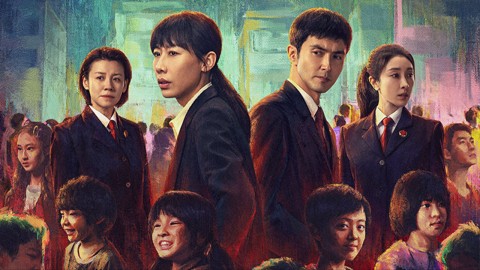Episode Summary
Key audio evidence leads investigators Lin Zhitao and Bai Enyu to uncover the true identity and tragic past of Hu Minmin (real name Hu Meimei). Lured away as a teen by Wan Xuemin with false promises of dance training, she endured years of abuse, bore a child (Hu Li), and was later coerced into recruiting other vulnerable girls for him. The investigation exposed Wan Xuemin's extensive history of abusing numerous girls at his dance school. Despite a challenging court battle, the audio evidence and victim testimonies proved decisive, resulting in Wan Xuemin receiving the death penalty. The episode concludes years later, showing Hu Li recovering, Lu Sheng's family healing, and Lin Zhitao and Bai Enyu continuing their work protecting minors and educating children about their rights.

Spoiler Alert
Endless Protection: Episode 24 Recap & Spoilers
Alright, buckle up, because this episode brought some major breakthroughs and gut-wrenching revelations.
The episode kicks off with Lu Sheng handing over that absolutely crucial audio recording to the Juvenile Prosecutor's Office. This sends Lin Zhitao and Bai Enyu scrambling to figure out the real identity of the mysterious "Hu Minmin." Turns out, her actual name is Hu Meimei. The investigation paints a bleak picture of her childhood: she was the youngest, largely ignored by her parents, and seemed to be drifting without much of a future as she neared adulthood.
Then, Wan Xuemin entered the picture. He showed up in her village, sweet-talking her parents with an offer they couldn't refuse: free dance lessons for Hu Meimei, promising she'd make big money down the line. Hearing the magic word "free," her parents readily agreed and let Wan Xuemin take their daughter away.
A key piece of info comes from Hu Meimei's older sister. She reveals something shocking: Hu Li, the little girl everyone thought was Hu Meimei's younger "sister," is actually Hu Meimei's biological daughter. The initial suspicion, naturally, was that Wan Xuemin might be the father, but a DNA test quickly debunked that theory.
This case is blowing wide open, and it's serious enough that Director Zheng steps in to personally assist Lin Zhitao with the investigation into Wan Xuemin's history. They start digging into the past abuses, specifically focusing on the girls Wan Xuemin lured from villages. The pattern becomes horrifyingly clear: he'd promise dance training in the city, bring them to his school, and then subject them to long-term abuse.
Hu Meimei, we learn, was one of the very first girls he targeted back in 2006. After taking her from her village, Wan Xuemin abused her for years and even trafficked her to other men. Eventually, Hu Meimei became pregnant. When her child, Hu Li, fell gravely ill, she desperately returned home seeking help, only to be met with rejection from her family. With nowhere else to turn, Hu Meimei had no choice but to flee with Hu Li.
Unable to find decent work and likely desperate, Hu Meimei ended up back at the dance school, forced back under Wan Xuemin's control. Tragically, she then became complicit, helping him find other vulnerable girls – usually from poor families where they were neglected – using the same false promises of dance lessons and a better future that had trapped her years before.
As Lin Zhitao interviews these victims, the scale of Wan Xuemin's depravity is laid bare. Every single girl brought back suffered abuse. The evidence mounts up – hundreds of pages filled with harrowing testimonies, documenting Wan Xuemin's monstrous crimes.
The case returns to court. Wan Xuemin's previous lawyer, Li Daoran, apparently saw the writing on the wall and skipped out, knowing he couldn't win. So, Wan Xuemin gets a new defense lawyer – who happens to be a former teacher of Lin Zhitao's! This lawyer tries to argue that victim testimony alone isn't sufficient proof of the crime. Bai Enyu is absolutely livid, countering that the sheer number of victims pointing to Wan Xuemin, with consistent and clear details, must be considered strong evidence.
Then comes the clincher: the damaged MP3 player belonging to Hu Meimei is presented. The audio recovered from it provides undeniable proof that Wan Xuemin raped minors.
The verdict finally comes down: Wan Xuemin is found guilty and sentenced to death, stripped of his political rights for life. Justice, harsh but seemingly necessary, is served.
In the aftermath, we see Lu Sheng regularly visiting Hu Li at the welfare institution. Thanks to the care she's receiving, Hu Li is showing signs of recovery – her hair is growing longer, she's wearing dresses, and her overall state seems much improved. Lu Sheng's own family is also healing: his brother is back on a normal path, free from negative influences, and his mother's mental health is stabilizing.
Bai Enyu offers Lu Sheng some profound, if tough, advice: essentially, you have to take all the pain and setbacks you've endured, process them, and let them forge you into a stronger adult. Despite witnessing so much darkness, Bai Enyu stresses the importance of holding onto the warm, positive moments to maintain hope.
The episode jumps forward several years. Lin Zhitao and Bai Enyu are still partners at the Juvenile Prosecutor's Office, continuing their vital work on cases involving minors. Bai Enyu has even taken to visiting schools, educating children about their legal rights and using real case examples to teach them how to protect themselves.
The final moments offer a reflection: just as light casts shadows, hardship exists. Being a victim isn't a matter of destiny. Society needs people dedicated to justice, because their presence fosters harmony, clarity, and safety, ultimately allowing for more genuine happiness and smiles among the people. It's a somber but hopeful note to end on, acknowledging the ongoing fight against the darkness.
